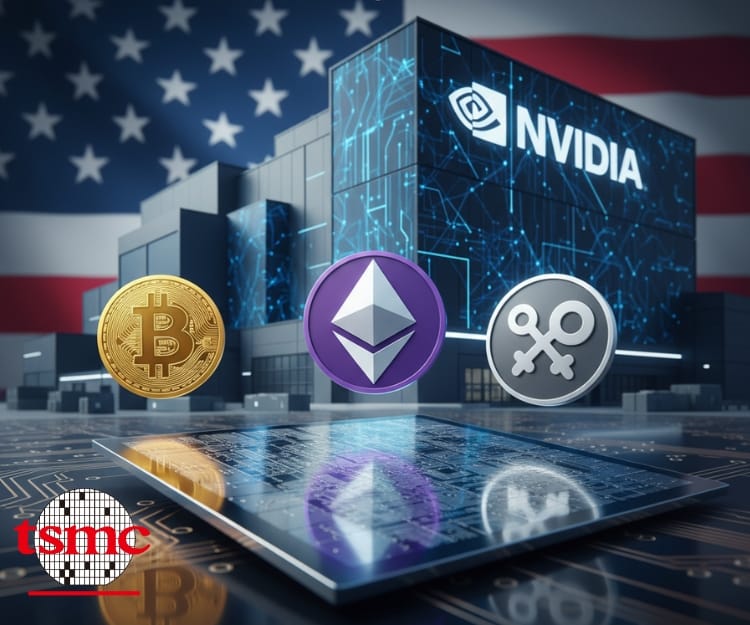NVIDIA and TSMC Launch First American-Made AI Chip Wafer
NVIDIA and TSMC announce first American-made AI chip wafer from Arizona facility. The landmark development promises thousands of jobs and game-changing advantages for U.S.-based crypto companies and blockchain innovation.

Major semiconductor breakthrough marks new era for U.S. tech manufacturing under the Trump administration
In a landmark development for American semiconductor manufacturing, NVIDIA and Taiwan Semiconductor Manufacturing Company (TSMC) have announced the production of their first-ever advanced AI chip wafer on U.S. soil. The companies stated that TSMC Arizona is expected to create thousands of high-tech jobs and attract a broad ecosystem of suppliers, signaling a major shift in global chip production that could reshape the technology landscape.
Historic Shift in Semiconductor Production
The announcement represents a pivotal moment in the semiconductor industry's return to American shores. TSMC's Arizona facility, which has been under construction since 2020, is now producing cutting-edge wafers for NVIDIA's AI processors—marking the first time such advanced chips have been manufactured domestically at scale. This development addresses longstanding national security concerns about America's dependence on Asian semiconductor production, particularly as AI technology becomes increasingly critical to economic competitiveness.
The timing of this announcement during President Trump's administration has been characterized as a validation of his "America First" manufacturing policies. The semiconductor industry has seen significant federal investment through initiatives like the CHIPS and Science Act, which allocated over $52 billion to boost domestic chip production. TSMC's Arizona investment alone exceeds $40 billion, representing one of the largest foreign direct investments in U.S. manufacturing history.
Broader Crypto and Tech Market Implications
This manufacturing milestone has far-reaching implications for the cryptocurrency and blockchain sectors, which depend heavily on advanced computing power. AI chips are essential for blockchain validation, crypto mining operations, and the development of next-generation decentralized applications. Domestic production could reduce supply chain vulnerabilities that have historically caused price volatility in both crypto mining equipment and the digital assets themselves.
The move also strengthens America's position in the global AI race, which increasingly intersects with blockchain technology. Projects combining AI and crypto—from decentralized AI networks to automated trading systems—require the type of advanced processing power that NVIDIA specializes in producing. Greater U.S. manufacturing capacity could accelerate innovation in this convergence space while potentially reducing costs for American blockchain companies.
Strategic Advantages for U.S.-Based Crypto Companies
For American cryptocurrency companies and blockchain projects, this development creates unprecedented strategic advantages. Domestic chip production means U.S.-based mining operations can secure hardware without navigating complex international supply chains or facing import restrictions. This could strengthen America's position in Bitcoin mining, where the country already accounts for a significant portion of global hash rate following China's 2021 mining ban.
U.S. blockchain infrastructure companies stand to benefit enormously from reliable access to cutting-edge processing power. Projects building layer-2 scaling solutions, zero-knowledge proof systems, and other computationally intensive protocols will have faster access to the hardware needed for development and deployment. Companies like Coinbase, Circle, and emerging DeFi platforms can leverage domestic chip production to enhance security infrastructure and transaction processing capabilities.
The regulatory implications are equally significant. American crypto companies have long argued that unclear regulations put them at a competitive disadvantage globally. However, with domestic semiconductor production strengthening U.S. technological sovereignty, policymakers may become more supportive of crypto innovation as part of broader national tech leadership. This could accelerate the path toward comprehensive crypto regulation that balances innovation with oversight.
Additionally, the intersection of AI and crypto becomes more accessible for U.S. startups. Decentralized AI protocols, AI-powered trading algorithms, and blockchain-based machine learning projects require the exact type of chips NVIDIA produces. Domestic availability reduces barriers to entry for American entrepreneurs building at this technological frontier, potentially positioning the U.S. as the global leader in AI-crypto convergence.
The energy efficiency of newer chip generations also benefits Bitcoin miners and proof-of-work networks. As environmental concerns around crypto mining persist, access to more efficient U.S.-manufactured chips could help American mining operations reduce their carbon footprint while maintaining profitability—addressing one of the industry's most persistent criticisms.
Conclusion: A New Chapter for American Tech
The NVIDIA-TSMC partnership marks more than just a manufacturing milestone—it represents a fundamental restructuring of global technology supply chains. For the U.S. crypto industry, enhanced domestic semiconductor capacity promises greater stability, faster innovation, and reduced exposure to international disruptions. As thousands of high-tech jobs emerge in Arizona and surrounding ecosystems develop, American blockchain companies gain a critical competitive advantage that could cement the United States as the global center for cryptocurrency innovation and infrastructure development.
DISCLAIMER: This newsletter is for informational purposes only and does not constitute investment advice, advertising, or a recommendation to buy, sell, or hold any securities. This content is not sponsored by or affiliated with any of the mentioned entities. Investments in cryptocurrencies or other financial assets carry significant risks, including the potential for total loss, extreme volatility, and regulatory uncertainty. Past performance is not indicative of future results. Always consult a qualified financial professional and conduct thorough research before making any investment decisions.



